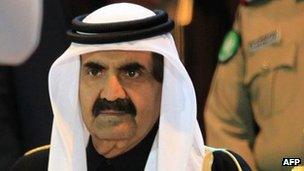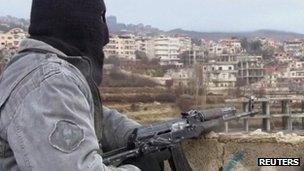Syria rejects Qatar call for Arab military intervention
- Published

The emir of Qatar was the first Arab leader to propose Arab military intervention
Syria's government has firmly rejected a call from Qatar for Arab troops to be deployed in the country to end the deadly crackdown on protesters.
A foreign ministry statement said such a move would "worsen the crisis... and pave the way for foreign intervention".
On Sunday, the emir of Qatar said "some troops should go to stop the killing".
An Arab League observer mission tasked with verifying the implementation of a peace plan has not ended the violence, which the UN says has left 5,000 dead.
At least 18 civilians have so far been killed on Tuesday, including eight who died when a minibus was hit by an explosion in the north-western province of Idlib and eight in the central city of Homs, according to the Syrian Observatory for Human Rights.
Another activist group, the Local Co-ordination Committees, put the death toll at 30, including 18 in Homs and seven in Idlib province.
The state news agency, Sana, meanwhile said six soldiers had been killed in a rocket attack on a rural checkpoint near the capital, Damascus.
'Astonished'
On Sunday, the Emir of Qatar, Sheikh Hamad Bin Khalifa Al Thani, became the first Arab leader to propose Arab military intervention to halt the violent crackdown on dissent by Syrian security forces.
He told the US television network CBS, external: "For such a situation to stop the killing... some troops should go to stop the killing."
Last year, the emir gave his full support to Nato's intervention in Libya to protect civilians, which helped rebels overthrow Muammar Gaddafi.
There has been little suggestion from other Arab states or Western powers that they are considering military intervention in Syria, and Arab League officials insisted on Sunday that there had been no agreement.
On Tuesday, the Syrian foreign ministry said it had been "astonished" by Qatar's suggestion, which it "absolutely rejected".
"Syria rejects the statements of officials of Qatar on sending Arab troops to worsen the crisis... and pave the way for foreign intervention," a statement said.
"The Syrian people... will oppose any attempt to undermine the sovereignty of Syria and the integrity of its territory."
"It would be regrettable for Arab blood to flow on Syria's territory to serve known [interests]," the statement added, without elaborating.
President Bashar al-Assad has blamed a "foreign conspiracy" for the 10-month uprising, and officials say "armed gangs and terrorists" have killed 2,000 security forces personnel.
The BBC's Jonathan Head, who is in neighbouring Turkey, says the Arab League is divided over what to do, and in any case has little experience of forming a multi-national peacekeeping force.
Such a force would also need either an invitation from the Syrian government, or the approval of the UN Security Council, and neither is likely, our correspondent adds.
'Unacceptable point'
The Arab League must also decide soon whether to withdraw its 165 monitors, whose mandate expires on Thursday, or keep them in Syria.
The organisation is expected to announce that Syria has failed to abide by the peace plan it accepted last year, which was supposed to see tanks and troops withdrawn from towns and cities, detained protesters released, access given to the media, and talks opened with the opposition.

The leader of the Free Syrian Army has urged the UN Security Council to intervene
It could also refer the matter to the UN Security Council, but until now Russia and China have prevented any action on Syria.
UN Secretary General Ban Ki-moon warned on Monday that the situation in Syria had "reached an unacceptable point".
The leader of the Free Syrian Army, a group of army defectors seeking to topple President Assad, also urged the Security Council to intervene.
"The Arab League and their monitors failed in their mission," Col Riyad al-Asaad told the Reuters news agency from Turkey.
"For that reason we call on them to turn the issue over to the UN Security Council and we ask that the international community intervene because they are more capable of protecting Syrians at this stage than our Arab brothers," he added.
Arab diplomats say the Syrian government is willing to extend the mandate of the observer mission and allow in more monitors, but would not allow an expansion of the mission's scope, according to Reuters.
In a separate development, the prominent human rights activist Najati Tayyara has been released from custody, according to the Syrian Observatory for Human Rights.
Mr Tayyara was arrested in May after criticising the abuse of pro-reformist protesters by the government. A judge ordered his release on bail on 29 August, but he was reportedly re-arrested the same day.